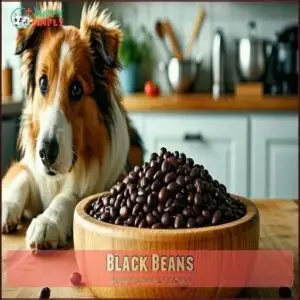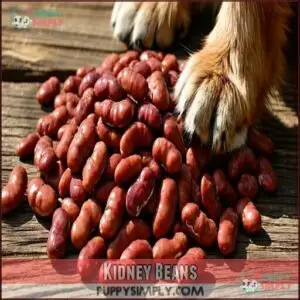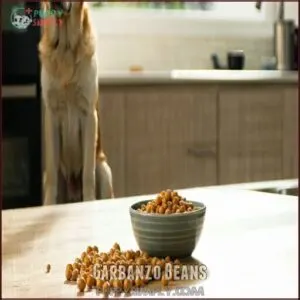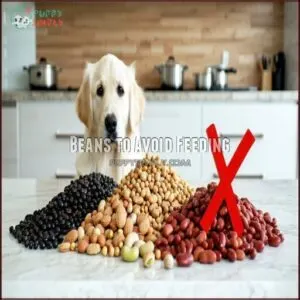This site is supported by our readers. We may earn a commission, at no cost to you, if you purchase through links.

Beans like green beans, black beans, and garbanzo beans can be great options as long as they’re plain, cooked, and free of added salt, spices, or oils.
They’re high in fiber and protein, which can support digestion and energy.
However, avoid feeding your dog raw or undercooked beans, canned beans with additives, or baked beans with harmful ingredients like sugar or onions.
Too many beans might lead to gas or upset stomachs, so moderation is key.
Want to make beans dog-safe? Preparation matters more than you’d think.
Table Of Contents
- Key Takeaways
- Benefits of Beans
- Can Dogs Eat Beans
- Safe Beans for Dogs
- Beans to Avoid Feeding
- Preparing Beans for Dogs
- Frequently Asked Questions (FAQs)
- Can dogs eat canned beans?
- What happens if a dog eats a lot of beans?
- Are beans good for dogs?
- Can dogs eat beans instead of meat?
- Can dogs eat pinto beans?
- Can dogs eat green beans?
- Is it safe for dogs to eat beans?
- Can eating beans make dogs sick?
- Can dogs eat lima beans or are they best avoided?
- What beans can dogs not eat?
- Conclusion
Key Takeaways
- Dogs can eat beans like green beans, black beans, and garbanzo beans if they’re cooked plain and served in moderation to avoid stomach issues.
- Avoid feeding dogs raw, undercooked, or canned beans with added salt and spices, as they can be harmful to their health.
- Some beans, like baked beans, refried beans, and raw kidney beans, are toxic and should never be given to dogs.
- Proper preparation, including thorough cooking and washing, ensures beans are safe and provide nutrients like fiber and protein.
Benefits of Beans
Beans are packed with nutrients like fiber, protein, and essential vitamins that help support your dog’s health.
Beans are nutrient powerhouses, boosting your dog’s health with fiber, protein, and essential vitamins—perfect for digestion, energy, and muscle growth!
They can improve digestion, boost energy, and even strengthen muscles when served in moderation.
Nutritional Value of Beans
Beans pack a punch for your dog’s diet! They’re loaded with nutrients like iron, potassium, magnesium, and folate. Plus, they’re low in calories, making them a guilt-free treat.
Consider these perks:
- High fiber improves digestion.
- Protein aids muscle health.
- Essential vitamins and minerals boost energy levels.
The nutritional content of beans for dogs is undeniably impressive! Some owners also give their dogs oral products to supplement their diet, which can be a guilt-free way to support their health, and overall, beans are a nutritious addition.
Health Benefits for Dogs
You might be surprised how healthy beans can be for your dog’s well-being. They promote Digestive Improvement, provide an Immune Boost, and aid Weight Management with low-fat content.
Packed with antioxidants, beans also support muscle growth and energy levels.
| Benefit | Impact on Dogs |
|---|---|
| Antioxidants | Fights free radicals, supports health |
| Dietary Fiber | Improves digestion, prevents issues |
| Protein | Assists muscle growth, energy source |
| Low-Fat Content | Supports healthy weight management |
Fiber and Protein Content
Your dog’s diet benefits from the fiber digestion and protein bioavailability beans offer.
Packed with amino acids, beans support muscle health and add satiety benefits to meals.
Fiber aids digestion and prevents constipation, while protein boosts energy and growth.
By including beans in your pup’s diet, you’re enhancing their nutritional value with a wholesome treat.
Can Dogs Eat Beans
Yes, dogs can have beans, but it’s vital to know which are safe.
Dogs can enjoy beans as a nutritious treat when prepared properly—packed with fiber, protein, and essential nutrients for a healthy boost.
Beans can be a great addition to your dog’s diet, offering fiber, protein, and nutrients, but feed them in moderation. Overfeeding beans for dogs may lead to gas or digestive upset. Avoid giving raw or undercooked beans, as they contain harmful toxins.
Here’s a quick guide:
- Safe options include green beans, black beans, lima beans, and kidney beans—fully cooked, of course.
- Toxic beans for dogs include raw kidney beans, coffee beans, and baked beans with harmful ingredients.
- Consider breed sensitivity or potential bean allergies before introducing new foods.
- For puppies or senior dogs, start with small amounts—“puppy portions”—to prevent stomach upset.
Beans add variety, but safety is key! It’s best to avoid feeding your dog high sodium canned beans.
Safe Beans for Dogs
You’ve got plenty of bean options that are safe and healthy for your dog when prepared correctly.
Green beans, black beans, lima beans, kidney beans, and garbanzo beans can all add nutritional benefits to your pup’s diet.
Green Beans
Green beans are one of the best safe beans for dogs, offering fiber, vitamins A, C, and K, and folate.
Their low calorie content makes them great for weight management.
Serve green beans fresh or cooked without salt or seasoning.
Avoid canned green beans with additives, and remember that moderation matters—too many may upset your pup’s stomach.
Black Beans
Black beans are a safe and healthy treat for dogs when served plain and cooked.
They are packed with Antioxidant Power, which supports aging pets and boosts Blood Health.
Their Fiber Source aids digestion, while Potassium Boost and Magnesium Content promote muscle and bone health.
Remember, beans for dogs should always be unseasoned, ensuring they’re safe and beneficial for overall dog health.
Lima Beans
Lima beans are a solid choice when adding beans to your dog’s diet. Packed with nutrients like calcium, magnesium, and zinc, they promote digestion and keep pups feeling full.
To safely prepare Lima beans, it is essential to follow some guidelines.
- Always cook Lima beans thoroughly.
- Serve plain, avoiding salt or spices.
- Start with small portions to monitor allergies.
- Consider alternatives like black beans if needed.
Kidney Beans
Kidney beans are safe for dogs, but only when cooked. Raw kidney beans contain lectins, making them toxic for dogs and causing digestive upset.
Always prepare them plain—skip salt, spices, and sauces. Their antioxidant power supports dog health.
Proper cooking methods neutralize toxins. Serving suggestions? Add softened beans as a treat, but moderation is key to avoid bean risks.
Garbanzo Beans
Garbanzo beans, or chickpeas, are safe for dogs when plain and cooked.
They’re packed with nutrients like protein, fiber, and iron that support digestion and overall health.
Avoid hummus, as it contains harmful ingredients like garlic.
Start slow and serve sparingly to monitor digestion factors, and use proper preparation methods, like rinsing and cooking, to enhance dog health beans benefits while ensuring safety.
Beans to Avoid Feeding
Not all beans are safe for your pup, and feeding the wrong kind can cause serious health issues.
It’s important to know which beans to avoid to keep your dog happy and healthy.
Canned Beans With Additives
Canned beans might seem convenient, but their sodium content, preservatives, and chemical additives pose significant risks for dogs.
High sodium can lead to dehydration, while these additives often cause digestion problems and obesity risks.
Even dog-safe beans can become toxic in canned form. Stick to fresh or dried options to protect your pup from unnecessary health issues and discomfort.
Raw or Undercooked Beans
Raw beans aren’t good for dogs. They’re tough to digest and contain lectins, which can lead to digestive distress.
Raw kidney beans, for example, have phytohemagglutinin, a toxin dangerous to dogs. Cooking is key to breaking down harmful compounds.
- Always cook beans thoroughly for safe preparation.
- Avoid giving raw beans due to lectin toxicity.
- Stick to cooked bean exceptions like green beans.
Chili Beans and Spicy Varieties
Chili beans aren’t safe for dogs due to toxic ingredients like spices, garlic, and onion, leading to spice toxicity, digestive irritation, and even kidney damage.
These beans can cause stomach upset and harm their sensitive systems.
Instead of risky flavors, consider safe spices or plain, cooked beans as alternatives.
Always avoid feeding dogs spicy or seasoned foods to protect their health.
Baked Beans With Harmful Ingredients
Baked beans may seem harmless, but they’re packed with toxic ingredients for dogs.
Tomato sauce, sugar, and additives can lead to digestive issues, pancreatitis risk, or red blood cell damage. Dogs with diabetes face extra risks.
If your pup gets curious, avoid these beans entirely. Remember, even small amounts of toxic beans can upset a dog’s sensitive system.
Plain black beans, however, can offer essential vitamins and minerals to provide a healthy alternative.
Preparing Beans for Dogs
When preparing beans for your dog, you need to focus on proper washing, soaking, and cooking to guarantee their safety.
Taking these steps helps reduce harmful lectins and makes the beans easier for your pup to digest.
Washing and Soaking Dried Beans
Before cooking beans, always wash them thoroughly under cool water to remove dirt and impurities—this is essential for safe bean preparation.
Next, soak the dried beans overnight using room-temperature water.
Soaking duration matters because it helps reduce toxic lectins, especially in varieties like kidney beans.
Consider bean washing products for superior cleaning.
Proper washing and soaking guarantee your dog gets the best nutrients without the risks.
Cooking Methods to Reduce Gas
Cook beans thoroughly to reduce gassiness in dogs and aid digestion.
Use these methods during preparation:
- Long Soaking: Soaking beans overnight eases digestion and cuts cooking duration.
- Pressure Cooking: Speeds up the process and destroys toxins for safer feeding.
- Thorough Cooking: Make certain all beans are soft to avoid digestive side effects.
Proper cooking supports beans preparation for dogs.
Dogs benefit from beans’ dietary fiber content.
Removing Shells and Pods
Bean shells and pods can be tough for dogs to digest and may pose a choking hazard. Certain bean varieties, like raw or toxic beans, have shells that impact digestion or contain harmful lectins.
Safe removal is key—peel pods and discard shells before serving. Consider using a bean shell remover for efficient preparation.
This guarantees fiber supports your pup’s health without causing discomfort or digestion issues from pod digestion, ensuring a healthy outcome.
Serving Size and Frequency
To keep your pup happy and healthy, treat beans as a snack, not a meal.
Follow the Daily Bean Limit—start small with Puppy Bean Portions (1 teaspoon for little dogs) or up to 1/2 cup for bigger breeds.
Consider dog food products for balanced nutrition.
Always adjust beans serving size based on Breed Size Impact and moderation, and stick to occasional servings to avoid digestive upset.
Frequently Asked Questions (FAQs)
Can dogs eat canned beans?
Ever wonder if canned beans are safe for dogs?
They’re not ideal—they’re packed with salt, preservatives, and additives that can upset your dog’s stomach.
Stick to plain, cooked beans instead for a healthier treat!
What happens if a dog eats a lot of beans?
If your dog eats too many beans, they could experience bloating, gas, or diarrhea.
Beans are healthy in moderation, but overindulgence might upset their stomach or cause discomfort.
Always serve small portions to avoid issues.
Are beans good for dogs?
Yes, beans can be a healthy treat for your dog when prepared properly.
They’re packed with fiber, protein, and essential nutrients, but always cook them thoroughly and serve in moderation to avoid digestive issues.
Can dogs eat beans instead of meat?
Beans can’t fully replace meat in a dog’s diet.
While beans offer protein and nutrients, dogs need meat for essential amino acids and nutrients.
Beans can supplement meals, but stick to a balanced diet for ideal health.
Can dogs eat pinto beans?
Imagine a tiny powerhouse in your dog’s bowl.
Pinto beans are safe in moderation, offering fiber, protein, and antioxidants.
Cook thoroughly, skip the seasoning, and remember—beans are a treat, not a meal substitute.
Can dogs eat green beans?
Green beans are a safe, healthy treat for dogs when served plain and fresh, frozen, or cooked.
They’re low in calories, rich in vitamin C and fiber, and can be a crunchy, guilt-free snack!
Is it safe for dogs to eat beans?
Dogs can eat beans safely in moderation if they’re cooked plain without added salt, spices, or seasonings.
Avoid raw and canned beans, as well as baked or refried beans, which can harm their health, and only moderation is advised.
Can eating beans make dogs sick?
A little too much can turn something good sour—eating beans might upset your dog’s stomach if raw, undercooked, or overly spiced.
Keep portions small, fully cooked, and plain to avoid digestive woes.
Can dogs eat lima beans or are they best avoided?
Lima beans are safe for dogs if cooked thoroughly and served plain.
They’re packed with fiber, protein, and essential nutrients like calcium and magnesium.
Avoid canned ones due to additives, and always feed in moderation.
What beans can dogs not eat?
Not all beans are dog-safe.
Avoid feeding baked beans, refried beans, raw kidney beans, coffee beans, or chili beans.
They contain toxins, harmful ingredients, or spices that can upset digestion or cause serious health issues.
Conclusion
Feeding beans to your dog is like planting seeds of health—choose carefully, tend to preparation, and watch benefits grow.
While beans offer fiber and protein, not all are safe.
Stick to dog-friendly options like green beans or garbanzo beans, prepared plainly, and steer clear of raw, canned, or seasoned varieties.
Remember, moderation is key to avoid stomach upset.
So, can dogs eat beans? Yes, when you prepare wisely and serve thoughtfully, they’re a great addition to your pup’s diet.

















